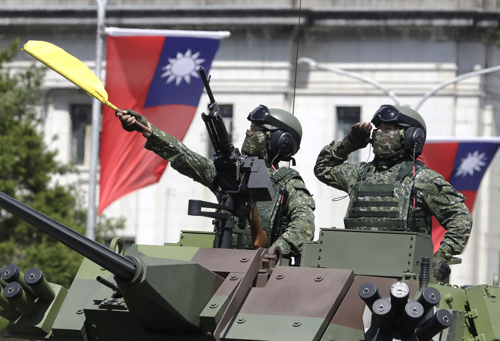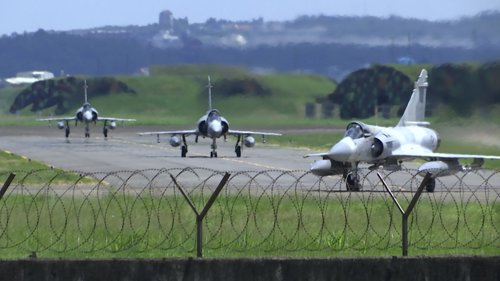With the second term of Donald Trump just now hitting the five-month mark, Gary Bauer of American Values tells AFN he is watching news around the world with deep concern. From a war with China over Taiwan to Iran’s nuclear bomb plans, Bauer says it feels like war could break out anywhere.
Worse, he adds, it will take years for the new administration to prepare the U.S. armed forces to fight and win.
“Unfortunately,” Bauer says, “under Biden and Harris we had four years of foreign policy disasters which weakened America and strengthened our enemies.”
Taiwan could trigger World War III
Asked by AFN to share his own concerns, national security analyst Bob Maginnis said the “growing tension” over Taiwan concerns him most.
“Of all the regions on the brink, this is the one with the greatest potential to trigger a global conflict, perhaps even World War III,” Maginnis said via email.
Maginnis, a retired U.S. Army lieutenant colonel, pointed AFN to timely comments made by Defense Secretary Pete Hegseth. Speaking over the weekend at a security conference in Singapore, Hegseth flatly warned the Chinese military is “rehearsing for the real deal.”
 “We do not seek conflict with communist China," Hegseth said. "But we will not be pushed out of this critical region and we will not let our allies and partners be subordinated and intimidated."
“We do not seek conflict with communist China," Hegseth said. "But we will not be pushed out of this critical region and we will not let our allies and partners be subordinated and intimidated."
Located just 100 miles from mainland China, Taiwan has been an independent nation ever since Chiang Kai-shek and his nationalist government fled there after World War II to escape the Communists led by Mao Zedong.
The island nation, home to 23 million citizens, stretches 245 miles north to south making its land mass about the same size as Maryland.
China considers Taiwan the property of China, and its plan to eventually control the island is known as the “One China Policy” by the Chinese Communist Party.
 Even though China’s vow to control Taiwan goes back decades, Maginnis says the Pentagon has watched Beijing ramp up its military drills around the island which includes simulating a naval blockade and rehearsing amphibious landings.
Even though China’s vow to control Taiwan goes back decades, Maginnis says the Pentagon has watched Beijing ramp up its military drills around the island which includes simulating a naval blockade and rehearsing amphibious landings.
“These maneuvers are not simply posturing,” Maginnis warned. “They are part of an integrated campaign to wear down Taiwan’s resolve and test the response of the West.”
If the Chinese communists do invade Taiwan, the military conflict would “almost certainly” include the United States, Maginnis advised. That, in turn, he said, would draw allies such as Japan and Australia into a military fight in the Taiwan Strait.
According to Bauer, what concerns him most about war breaking out anywhere around the globe is not just a war against China in the Pacific or Russia in Europe. He is concerned they may panic.
A multi-front war around the globe
“I am deeply concerned that the axis of Iran, Communist China, Russia, North Korea,” he observes, “may have made a decision that they're willing to risk everything before America gets strong enough to stop them.”
 In his comments to AFN, Maginnis also described a future scenario involving those “axis” countries that are allies and also U.S. adversaries. If a shooting war breaks out over Taiwan, he wrote, Russia and North Korea could “exploit” a U.S.-China war and open up a front in Europe and South Korea.
In his comments to AFN, Maginnis also described a future scenario involving those “axis” countries that are allies and also U.S. adversaries. If a shooting war breaks out over Taiwan, he wrote, Russia and North Korea could “exploit” a U.S.-China war and open up a front in Europe and South Korea.
“In short,” Maginnis summarized, “a miscalculation in the Taiwan Strait could ignite a global chain reaction involving multiple nuclear-armed powers.”

Despite that dire, apocalyptic-like scenario, Maginnis said he sees “emerging signs” the Trump administration is preparing the armed forces for its job to fight and win a war. There is a renewed focus on stockpiling munitions for a major conflict, for example, rather than relying on just-in-time production.
Hegseth is also overseeing a “strategic realignment” in the Indo-Pacific, Maginnis advises. Right now, naval and air assets are being positioned closer to key areas, and the logistics hubs that would get munitions and food to troops on the frontlines are being expanded.
“Taken together," Maginnis concludes, "these developments reflect a Pentagon that is no longer sleepwalking through the post-Cold War era but is instead awakening to the realities of great-power competition."







